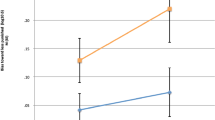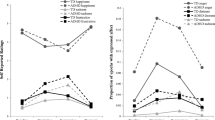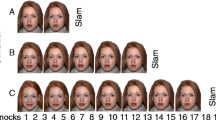Abstract
This study examined the differential effects of frustration on normal children and those diagnosed as having Attention Deficit Disorder with Hyperactivity. Each group consisted of 16 boys between the ages of 6 and 8 years who were prematched for age, grade, and classroom placement. All children completed a series of arithmetic problems in order to earn toy rewards. Using a variant of Mischel's (1974) delay-of-gratification paradigm, children were presented with two choice-of-delay conditions in a randomly assigned, counterbalanced sequence: (1) a free-choice conflict situation involving a longpassive or short-active reward delay, and (2) a short-active delay. Results showed that a significantly greater proportion of hyperactive children chose to complete problems for an immediate reward compared to their normal control counterparts (p < .01). Group differences were no longer apparent in the short-active delay trial. The results are discussed in terms of frustration tolerance and contributing factors such as cognitive-attentional style. Implications for treatment and future directions are delineated.
Similar content being viewed by others
References
American Psychiatric Association. (1980).Diagnostic and Statistical Manual: DSM-III (3rd ed.). Washington, D.C.: Author.
Bandura, A., & Walters, R. (1981). Aggression. In H. Stevenson (Ed.),Child psychology (pp. 364–415). Chicago: University of Chicago Press.
Barkley, R. A. (1981).Hyperactive children: A handbook for diagnosis and treatment. New York: Guilford Press.
Barkley, R. A., & Jackson, T. L. (1977). Hyperkinesis, autonomic nervous system activity and stimulant drug effects.Journal of Child Psychology and Psychiatry, 18, 347–357.
Campbell, S. B., & Douglas, V. I. (1972). Cognitive styles and responses to the threat of frustration.Canadian Journal of Behavioral Sciences, 4, 30–42.
Campbell, S. B., Douglas, V. I. & Morgenstern, G. (1971). Cognitive styles in hyperactive children and the effect of methylphenidate.Journal of Chilli Psychology and Psychiatry, 12, 55–67.
Conners, C. K., & Eisenberg, L. (1963). The effects of methylphenidate on symptomatology and learning in disturbed children.American Journal of Psychiatry, 120, 458–464.
Conners, C., Rothschild, G., Eisenberg, L., Stone, L., & Robinson, E. (1969). Dextroamphetamine in children with learning disorders.Archives of General Psychiatry, 21, 182–190.
Denton, C. L., & McIntyre, C. W. (1978). Span of apprehension in hyperactive boys.Journal of Abnormal Child Psychology, 6, 19–24.
Douglas, V. I. (1965). Children's responses to frustration. A developmental study.Canadian Journal of Psychology, 19, 161–171.
Douglas, V. I. (1972). Stop, look and listen: The problem of sustained attention and impulse control in hyperactive and normal children.Canadian Journal of Behavioral Science.4, 259–282.
Douglas, V. I. (1974). Sustained attention and impulse control: Implications for the handicapped child. In J. A. Swets & L. L. Elliot (Eds.),Psychology and the handicapped child (pp. 149–168). Washington, D.C.: U.S. Office of Education.
Douglas, V. I., Parry, P., Marton, P., & Garson, C. (1976). Assessment of a cognitive training program for hyperactive boys.Journal of Abnormal Child Psychology, 4, 389–410.
Dunn, L. M., & Markwardt, F. C. (1970).Peabody Individual Achievement Test. Circle Pines, Minnesota: American Guidance Service.
Fenichel, O. (1945).The psychoanalytic theory of neurosis. New York: Norton.
Firestone, P., & Douglas, V. (1975). The effects of reward and punishment on reaction times and autonomic activity in hyperactive and normal children.Journal of Abnormal Child Psychology, 3, 201–216.
Freibergs, V., & Douglas, V. I. (1969). Concept learning in hyperactive and normal children.Journal of Abnormal Psychology, 74, 388–395.
Goldberg, J. P., & Konstantareas, M. M. (1981). Vigilance in hyperactive and normal children on a self-paced operant task.Journal of Child Psychology and Psychiatry, 22, 55–63.
Hollingshead, A. B. (1975).Four factor index of social status. New Haven: Yale University, Department of Sociology.
Homatidis, S., & Konstantareas, M. M. (1981). Assessment of hyperactivity: Isolating measures of high discriminant ability.Journal of Consulting and Clinical Psychology, 49, 533–541.
Horwitz, S. (1981, May).Diagnosing error patterns in mathematics. Worshop presentation at the CSDE Title I Spring Conference, Meriden, Connecticut.
Jones, R. L. (1966). The hyperkinetic child: Some consensually validated behavioral correlates.Exceptional Children, 32, 635–637.
Kagan, J., Rosman, B. L., Day, D., Albert, J., & Phillips, W. (1964). Information processing in the child: Significance of analytic and reflective attitudes.Psychological Monographs,78(1, Whole No. 578).
Kendall, P. C., & Finch, A. J. (1978). A cognitive-behavioral treatment for impulsivity: A group comparison study.Journal of Consulting and Clinical Psychology, 46, 110–118.
Lahey, B. B., Green, K. D., & Forehand, R. (1980). On the independence of ratings of hyperactivity, conduct problems, and attention deficits in children: A multiple regression analysis.Journal of Consulting and Clinical Psychology, 48, 566–574.
Meichenbaum, D. H., & Goodman, J. (1971). Training impulsive children to talk to themselves: A means of developing self-control.Journal of Abnormal Psychology, 77, 115–126.
Menkes, M. M., Rowe, J. S., & Menkes, J. H. (1967). A twenty-five year follow-up on the hyperkinetic child with minimum brain dysfunction.Pediatrics, 39, 393–399.
Minde, K., Lewin, D., Weiss, G., Lavigueur, H., Douglas, V., & Sykes, E. (1971). The hyperactive child in elementary school: A 5-year, controlled follow-up.Exceptional Children, 38, 215–221.
Mischel, W. (1974). Process in delay of gratification. In L. Berkowitz (Ed.),Advances in experimental social psychology (Vol. 7, pp. 249–292). New York: Academic Press.
Mischel, W. (1979). On the interface of cognition and personality. Beyond the person-situation debate.American Psychologist, 34, 740–754.
Mischel, W. (1980). Metacognition and the rules of delay. In J. H. Flavell & L. Ross (Eds.),Social cognitive development: Frontiers and possible futures (pp. 240–271). New York: Cambridge University Press.
Mischel, W., & Ebbesen, E. (1970). Attention in delay of gratification.Journal of Personality and Social Psychology, 21, 204–218.
Mischel, W., & Mischel, H. N. (1979, March 18).The development of children's knowledge of self-control. Paper presented at the meeting of the Society for Research in Child Development, San Francisco.
Mischel, W., & Moore, B. (1973). Effects of attention to symbolically presented rewards upon self-control.Journal of Personality and Social Psychology, 28, 172–179.
Mischel, W., & Moore, B. (1980). The role of ideation in voluntary delay for symbolically presented awards.Cognitive Therapy and Research, 4, 211–221.
Moore, B., Mischel, W., & Zeiss, A. (1976). Comparative effects of the reward stimulus and its cognitive representation in voluntary delay.Journal of Personality and Social Psychology, 34, 419–424.
Parry, P. A., & Douglas, V. I. (1983). Effects of reinforcement on concept identification in hyperactive children.Journal of Abnormal Child Psychology, 11, 327–340.
Rapoport, D. (1951).Organization and pathology of thought. New York: Columbia University Press.
Rapport, M. D., DuPaul, G. J., Stoner, G., Birmingham, B. K., & Masse, G. (1985). Attention deficit disorder with hyperactivity: Differential effects of methylphenidate on impulsivity.Pediatrics, 76, 938–943.
Rapport, M. D., Murphy, A., & Bailey, J. S. (1980). The effects of a response cost treatment tactic on hyperactive children.Journal of School Psychology, 18, 98–111.
Rapport, M. D., Murphy, A., & Bailey, J. S. (1982). Ritalin vs. response cost in the control of hyperactive children: A within subject comparison.Journal of Applied Behavior Analysis, 15, 205–216.
Riddle, K. D., & Rapoport, J. L. (1976). A 2-year follow-up of 72 hyperactive boys. Classroom behavior and peer acceptance.Journal of Nervous and Mental Disease, 162, 126–134.
Routh, D. K., Schroeder, C. S., & O'Tuama, L. (1974). Development of activity level in children.Developmental Psychology, 10, 163–168.
Skinner, B. F. (1969).Waiden Two. New York: Macmillan.
Stevenson, H. W. (1972).Children's learning. New York: Appleton-Century-Crofts.
Sykes, D. H., Douglas, V. I., & Morgenstern, G. (1973). Sustained attention in hyperactive children.Journal of Child Psychology and Psychiatry, 14, 213.
Thurston, C. M., Sobol, M. P., Swanson, J., & Kinsbourne, M. (1979). Effects of methylphenidate (Ritalin) on selective attention in hyperactive children.Journal of Abnormal Child Psychology, 7, 471–481.
Weiss, G. (1975). The natural history of hyperactivity in childhood and treatment with stimulant medication at different ages: A summary of research findings.International Journal of Mental Health, 4, 213–226.
Weiss, G., & Hechtman, L. (1979). The hyperactive child syndrome.Science, 205, 1348–1353.
Weiss, G., Minde, K., Werry, J., Douglas, V., & Nemeth, E. (1971). Studies of the hyperactive child-VIII. Five year follow-up.Archives of General Psychiatry, 21, 409–414.
Werry, J., Sprague, R., & Cohen, M. (1975). Conners Teacher Rating Scale for use in drug studies with children.Journal of Abnormal Child Psychology, 3, 217–229.
Whalen, C. K., Collins, B. E., Henker, B., Alkus, S. R., Adams, D., & Stapp, J. (1978). Behavior observations of hyperactive children and methylphenidate (Ritalin) effects in systematically structured classroom environments: Now you see them, now you don't.Journal of Pediatric Psychology, 3, 177–187.
Wikoff, R. L. (1976). Correlational and factor analysis of the Peabody Individual Achievement Test and the WISC-R.Journal of Consulting and Clinical Psychology, 46, 322–325.
Wright, M. E. (1943). The influence of frustration upon the social relations of young children.Character and Personality, 12, 111–122.
Yates, B. T., & Mischel, W. (1979). Young children's preferred attentional strategies for delaying gratification.Journal of Personality and Social Psychology, 37, 286–300.
Author information
Authors and Affiliations
Additional information
This research was supported in part by a University of Rhode Island Foundation Fellowship.
The authors wish to thank the teachers and principals at Hamilton, Peacedale, and Wickford Elementary Schools for their cooperation and support in conducting this study. Appreciation is extended to Al Murphy and Stuart Vyse for their valuable review comments and to Anne Famiglietti for her assistance in preparing this manuscript.
Rights and permissions
About this article
Cite this article
Rapport, M.D., Tucker, S.B., DuPaul, G.J. et al. Hyperactivity and frustration: The influence of control over and size of rewards in delaying gratification. J Abnorm Child Psychol 14, 191–204 (1986). https://doi.org/10.1007/BF00915440
Revised:
Issue Date:
DOI: https://doi.org/10.1007/BF00915440




